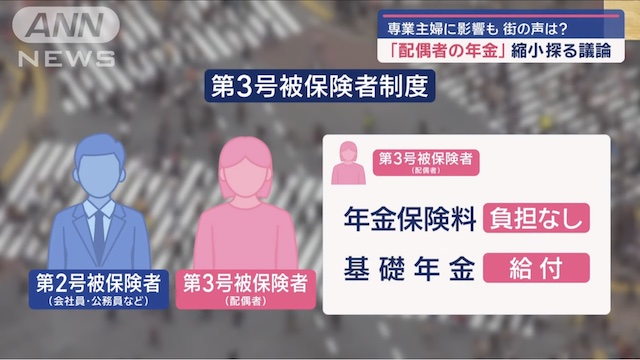TOKYO, May 16 (News On Japan) - Japan’s pension system is under review, and a key focus is on the "spousal pension" benefits. For homemakers, this is a pressing concern.

Homemaker (40s): "The thought of not receiving what we’ve been getting so far is quite alarming."
Homemaker (30s): "It’s worrying to think that the money we’re supposed to get might be reduced or eliminated."
The debate centers around the "Category III insured persons system," which allows homemakers to receive pensions without paying premiums.
However, even under the current system...
Single person (50s): "When I realized that homemakers can get pensions without paying for them, I felt it was a bit unfair."
The revision of the pension system has sparked mixed reactions. What’s your stance?
Job-seeking student (20s): "In the past, there was the term 'marriage retirement,' but nowadays, everyone is expected to work, and both parents are expected to be employed, so I want to work until the end."
Will this affect women's employment? On May 13, the Ministry of Health, Labour and Welfare held a social security council where the Category III insured persons system was a key topic.
The Category III insured persons system allows spouses of company employees to receive a basic pension without paying insurance premiums.
Conditions include being the spouse of an employee covered by employees' pension insurance, being between 20 and 59 years old, and earning less than 1.3 million yen annually. Over 7 million people are currently eligible.
The main criticism of the Category III insured persons system is its perceived unfairness.
Dual-income household (40s): "Looking at my pay slip, I feel the burden of paying insurance premiums. It feels unfair compared to homemakers."
Forty years ago, households with homemakers were the majority, but now they have reduced to less than half of dual-income households, highlighting a discrepancy with current realities.
Single person (50s): "Why should people who aren’t working get pensions? I’ve been paying into the system every month. It feels unfair. Maybe I should have become a homemaker. But everyone has their own path in life, so I guess it can’t be helped."
Another issue is the so-called "1.3 million yen barrier," which limits the work of women who wish to remain eligible.
While working patterns are changing, about 30% of women in their late 30s and older fall under the Category III insured persons system.
If abolished, homemakers would need to pay new insurance premiums, potentially disrupting their financial plans. Additionally, there is concern that future pension payments could decrease.
Homemaker (40s): "If we don’t get the pension, we’ll need to save separately for the future costs of raising children. What should we do?"
In the recent council meeting, many opinions were voiced that the system should be revised to make it easier to join the employees' pension system, thus reducing the number of eligible recipients.
Source: ANN














